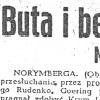| Source | Dziennik Ba³tycki 23 March 1946 |
| Event referred to | Nurnberg Trial |
| Technological characteristics | Type of file: text
Extension pdf
Characteristics
Dimension of the file: small article
Availability proposed
|
| Description of the source | Kind of source: Newspaper article
Origin of the source: Archive
Language: polish
Copyright issues: printable
|
| Contextualisation of the source | The article appeared on 23 March 1946 in " Dziennik Ba³tycki" - during the Nurnberg Trial after the Second World War. It is an account of the trial of Herman Goering - the leader of the German Nazi Party. Goering was one of the German war criminals. He was accused of genocide and participation in apropriation of belongings of people inhabiting coquered territories. On the 30 Septembre 1946 Goering was sentenced to death. |
| Interpretation of the source | "Dziennik Ba³tycki" was a govenment newspaper. The articles contained ideas and views represented by Polish Govenment. They were censored and did not present objective account of events. The source undermines Goering's words in a way that makes him contradict himself. Maybe the authors had their reasons to act like that however, it wasn't objective. |
| Original Contents | Buta i bezczelnoϾ Goeringa przekracza granice. Niepotrzebne sensacje procesu w Norymberdze - Goering`s insolence and arrogance exceed all limits. Unnecessary sensation of the Nuremberg trial |
| Original Contents (English Translation) | NUREMBERG. During the examination by Soviet prosecutor Rudenko, Georing admitted that Hitler had wanted to capture the Crimea, and ‘the three Baltic states seized by Russia’. He added that he had always believed the Soviet Union’s Drang nach Westen (pressure towards the West) doctrine had been a major risk for Germany, yet at the same time, he denied that the plans of annexation had been formulated before the war.
Goering stated: ‘I did not want the bear skin before the bear was shot’. Rudenko exclaimed, ‘Fortunately that hasn’t happened’. Goering replied, ‘Fortunately for you’. A verbal dueling ensued between Goering and prosecutor Rudenko.
Goering admitted that the greatest possible advantage was taken of compulsory labour, but he repeatedly objected to Rudenko’s term of ‘slavery’. Goering maintains that executions of civilians were legal repressive measures for partisan actions, although he admitted that ‘by adding a zero’, Hitler increased from 5 to 10 to 50-100 the number of Russians that were to be executed in response to every killed German.
In order to avoid questions, Goering juxtaposed his position in Luftwaffe with his role in the party, first, by claiming that he knew nothing of repressive directives as this was not a responsibility of Luftwaffe, and then by maintaining that as the leader of the Nazi party he did not deal with such unimportant details as executing prisoners.
|
